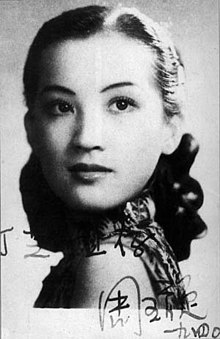Zhou Xuan
| Zhou Xuan | |
|---|---|
 |
|
| Background information | |
| Chinese name | 周璇 |
| Pinyin | Zhōu Xuán (Mandarin) |
| Birth name | Su Pu (蘇璞) |
| Born |
August 1, 1918 Changzhou, Jiangsu, China |
| Died | September 22, 1957 (aged 39) Shanghai |
| Occupation | Singer, actress |
| Genre(s) | Shidaiqu |
| Years active | 1935-57 |
Zhou Xuan (August 1, 1918 – September 22, 1957), also romanized as Chow Hsuan, was an iconic Chinese singer and film actress. By the 1940s, she had become one of China's seven great singing stars. She was the best known of the seven, nicknamed the "Golden Voice", and had a concurrent movie career until 1953. She recorded more than 200 songs and appeared in over 40 films in her career.
Zhou was born Su Pu (蘇璞), but was separated from her natural parents at a young age and raised by adoptive parents. She spent her entire life searching for her biological parents but her parentage was never established until after her death.
According to later family research, a relative who was an opium addict took her at the age of 3 to another city and sold her to a family named Wang, who named her Wang Xiaohong. She was later adopted by a family named Zhou, changing her name to Zhou Xiaohong.
At the age of 13, she took Zhou Xuan as her stage name, 'Xuan' () meaning beautiful jade in Chinese.
In 1932, Zhou began acting as a member of Li Jinhui's Bright Moon Song and Dance Troupe. When she was fourteen, she won second prize in a singing contest in Shanghai and was given the nickname "Golden Voice" (金嗓子) for her effortless high-pitched melodies.
Zhou began her film career in 1935, and she achieved stardom in 1937 when director Yuan Muzhi cast her as one of the leads as a singing girl in Street Angel. Zhou rapidly became the most famous and marketable popular singer in the gramophone era up to her death, singing many famous tunes from her own movies.
Between 1946 and 1950, she often went to Hong Kong to make films such as "All-Consuming Love" (長相思), "Hua wai liu ying" (花外流鶯), "Qinggong mishi" (清宮秘史), and "Rainbow Song" (彩虹曲). After introducing "Shanghai Nights" (夜上海) in 1949, Zhou returned to Shanghai. She spent the next few years in and out of a mental institutions owing to frequent breakdowns. Through the years, Zhou led a complicated and unhappy life marked by her failed marriages, illegitimate children, and suicide attempts. Zhou's first husband was the composer Yan Hua (严华, 1912-1992), who wrote and sometimes also performed songs with her.
...
Wikipedia
